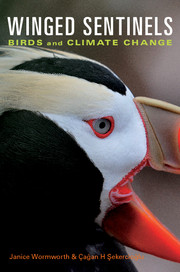Book contents
- Frontmatter
- CONTENTS
- ACKNOWLEDGEMENTS
- Introduction: The Free Advice of Birds
- Chapter 1 Phenology: Seasonal Timing and Mismatch
- Chapter 2 Migratory Birds Face Climate Turbulence
- Chapter 3 Range Shifts and Reshuffled Communities
- Chapter 4 Seabirds Herald Ocean Changes
- Chapter 5 Climate Change, Abundance and Extinction
- Chapter 6 Tropical Warming and Habitat Islands
- Chapter 7 Shifting Ground on Conservation
- NOTES
- INDEX
- PLATE SECTION
- PLATE SECTION
- PLATE SECTION
Chapter 5 - Climate Change, Abundance and Extinction
Published online by Cambridge University Press: 05 March 2012
- Frontmatter
- CONTENTS
- ACKNOWLEDGEMENTS
- Introduction: The Free Advice of Birds
- Chapter 1 Phenology: Seasonal Timing and Mismatch
- Chapter 2 Migratory Birds Face Climate Turbulence
- Chapter 3 Range Shifts and Reshuffled Communities
- Chapter 4 Seabirds Herald Ocean Changes
- Chapter 5 Climate Change, Abundance and Extinction
- Chapter 6 Tropical Warming and Habitat Islands
- Chapter 7 Shifting Ground on Conservation
- NOTES
- INDEX
- PLATE SECTION
- PLATE SECTION
- PLATE SECTION
Summary
Human fingerprints on Earth's coldest crèche
Take it all in all, I do not believe anybody on Earth has a worse time than an Emperor Penguin.
Apsley Cherry-Garrard, 1922The ice-dependent emperor penguin is an Antarctic icon that has come to symbolise the threat of a warming world. Yet on the first winter visit to any emperor colony, a too-warm Antarctica is a scenario English explorer Apsley Cherry-Garrard probably never considered. A frail man with terrible eyesight, 24-year-old Cherry-Garrard was an unlikely choice for Robert Scott's 1910 Terra Nova Expedition to Antarctica. As Cherry-Garrard himself acknowledged, ‘doctors had nearly refused to let me go because I could only see the people across the road as vague blobs walking.’ Yet chosen he was, and in the months before Scott's fateful trek to the South Pole, Cherry-Garrard was given the task with retrieving eggs from a colony of incubating emperor penguins, Aptenodytes forsteri, in the coldest breeding environment of any bird. The young Oxford graduate described the mid-winter trip in his book, The Worst Journey in the World.
The trek from the Cape Evans expedition base camp on Ross Island to the emperor colony was only about 108 kilometres, but it took Cherry-Garrard and his two companions almost three weeks to reach it, manhauling two sleds laden with almost 345 kilograms of supplies in temperatures down to about minus 60°C. When the weather rendered his spectacles useless, Cherry-Garrard was compelled to travel half-blind, causing him to stumble and fall. Arriving near the emperor colony at Cape Crozier, Cherry-Garrard found an alien world, ‘a breeding-place of wind and drift and darkness. God! What a place!’ The men finally laid eyes on the birds after a dangerous climb across ice ridges and crevasses. As they disturbed the milling penguins, the birds lost purchase of their eggs and called out, ‘trumpeting with their curious metallic voices’.
- Type
- Chapter
- Information
- Winged SentinelsBirds and Climate Change, pp. 127 - 161Publisher: Cambridge University PressPrint publication year: 2011



